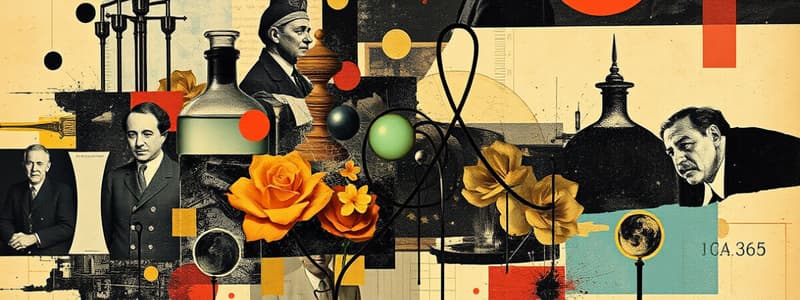Podcast
Questions and Answers
Who proposed the idea that matter is composed of individual elements?
Who proposed the idea that matter is composed of individual elements?
Democritus
What did Plato and Aristotle think everything was made up of?
What did Plato and Aristotle think everything was made up of?
- Water, earth, fire, and air (correct)
- Molecules
- Atoms
- Subatomic particles
What significant theory did John Dalton come up with?
What significant theory did John Dalton come up with?
Atomic theory
What did J.J. Thompson discover?
What did J.J. Thompson discover?
What was the purpose of Robert Millikan's oil drop experiment?
What was the purpose of Robert Millikan's oil drop experiment?
What model of the atom did Ernest Rutherford propose?
What model of the atom did Ernest Rutherford propose?
How did Neils Bohr improve upon Rutherford's model?
How did Neils Bohr improve upon Rutherford's model?
What did Maxwell Planck's research in 1900 tie together?
What did Maxwell Planck's research in 1900 tie together?
Who discovered the neutron?
Who discovered the neutron?
What model of the atom was established by Erwin Schrodinger and Werner Heisenberg?
What model of the atom was established by Erwin Schrodinger and Werner Heisenberg?
Flashcards are hidden until you start studying
Study Notes
Early Concepts of Matter
- Democritus (492 BC): Proposed that matter consists of indivisible elements called atoms, which occupy space.
- Plato and Aristotle (332 BC): Suggested that all matter is composed of four fundamental elements: earth, water, fire, and air.
Development of Atomic Theory
- John Dalton (1800): Formulated the atomic theory, asserting atoms are the basic building blocks of matter. His theory was later revised to acknowledge that atoms are divisible and can exist as different isotopes.
Discoveries of Subatomic Particles
- J.J. Thomson (1897): Discovered the electron, a negatively charged subatomic particle, using the Plum Pudding model to describe the atom's structure.
- Robert Millikan (1910): Conducted the oil drop experiment, which accurately measured the charge and mass of the electron.
Advancements in Atomic Models
- Ernest Rutherford (1909): Introduced the solar system model of the atom following his gold foil experiment, revealing the existence of the atomic nucleus and proposing a nuclear model of the atom.
- Niels Bohr (1912): Improved upon Rutherford's model by identifying specific energy levels for electrons, likening their movement around the nucleus to planetary orbits, with energy changes occurring in fixed intervals.
Theoretical Contributions
- Max Planck (1900): Established that radiation is connected to temperature, laying the groundwork for the particle theory of light.
- James Chadwick (1932): Discovered the neutron, adding to the understanding of atomic structure.
- Erwin Schrödinger and Werner Heisenberg (1932-1933): Developed the modern electron cloud model, describing the probabilistic nature of electron positions in atoms.
Studying That Suits You
Use AI to generate personalized quizzes and flashcards to suit your learning preferences.




